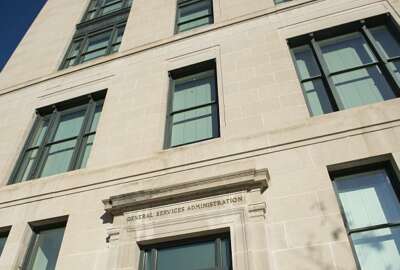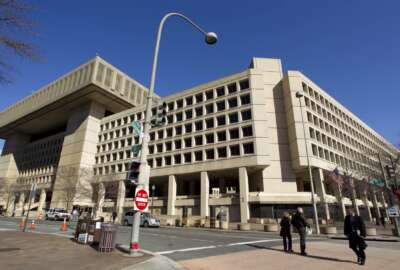

Hubbard Radio Washington DC, LLC. All rights reserved. This website is not intended for users located within the European Economic Area.
About a quarter of all federal leases held by the General Services Administration will expire within the next two years, giving the agency a big opportunity to ...
About a quarter of all federal leases held by the General Services Administration will expire within the next two years, giving the agency a big opportunity to renegotiate for longer-term leases on buildings where agencies plan on staying put — and at a lower rate.
Over the past 18 months, the Public Buildings Service has taken a “fresh look” at its leasing portfolio, said Allison Azevedo, PBS’s assistant commissioner for leasing, adding that the agency remains on track to achieve $4 billion in cost savings through its real estate portfolio by the end of 2023.
“When we say savings, it truly is the cost that we’re avoiding — by staying in place … not extending leases for a premium,” Azevedo said Thursday at a Society of Industrial and Office Realtors conference in Washington.
Through its year-and-a-half review, PBS found it had only renegotiated about 30-to-40% of its federal leases when they were set to expire. In reality, Azevedo said regional offices should consider themselves “minimally successful” if they replace 50% of their leases this year, or 70% of federal leases within the next two years.
The goal for PBS is to shrink the overall square footage from the existing federal inventory, renovate buildings with the highest return on investment, and then flip as much of that leased space back into its owned real estate inventory.
“This coming year is going to be more about strategic investments across the country, and those projects where we can really argue with OMB and Capitol Hill on why those projects should go forward, because of the savings that we really can generate for the taxpayer,” Azevedo said.
Consequently, those conversations will also include PBS getting the ball rolling on the government selling properties where the upkeep and liability are too great to justify having an agency tenant occupy the space.
Congress in 2016 passed the Federal Assets Sale and Transfer Act, aimed at streamlining the way the government disposes of excess property. The law required GSA to make its Federal Real Property Profile management system public. That same year, the agency identified nearly 11,000 buildings as underutilized or unoccupied.
However, the Public Buildings Reform Board (PBRB) launched under the legislation still lacks a chairman, because President Donald Trump has yet to submit a nominee. In addition, only four of the six board members have been appointed.
“We can’t reduce our empty space if we don’t have the staff to do it,” Sen. James Lankford (R-Okla.), chairman of the Homeland Security and Governmental Affairs Committee’s subcommittee on regulatory affairs and federal management, wrote last month in the latest volume his “Federal Fumbles” report on government waste.
Since the Obama administration, OMB has mandated GSA to shrink the overall federal real estate footprint.
In FY 2016, 24 agencies under the Chief Financial Officers Act made a net reduction of more than 11 million square feet — more than twice their target for that year. In FY 2017, those same agencies, minus the Defense Department, reported a net reduction of 1.2 million square feet — less than half their goal for that year.
Going forward, PBS expects to achieve substantial savings moving away from short-term five- or 10-year federal leases, considering that agencies, on average, stay in the same space for longer than 21 years.
“So why are we doing 10-year, five-year deals when we’re staying over 20 years? Where we’re staying that extra 10 years [we’re] paying for far more square footage than what we’re utilizing,” Azevedo said, adding that through the agency’s automated advanced acquisition platform, landlords have been able to give the PBS an array of lease pricing for different lengths of time.
But while the federal office footprint is shrinking, Kurt Stout, executive vice president of government solutions at Colliers International, said the federal workforce has held firm at more than 2 million employees for nearly half a century.
The significant reduction of real estate, Stout said, has occurred through an embrace of telework, which has also led to a rise in open-office redesigns at federal office buildings, in which employees outnumber workstations. As a result, most teleworking employees need to reserve a workspace ahead of time before showing up to the office.
“These are office environments in the federal inventory where people can come in and work for an hour, or work for a day. But generally, they’re not working in the office each week. They’re doing this workplace reconfiguration,” Stout said, estimating a 25-to-30% overall reduction in federal office square footage.
In recent years, however, the Education, Agriculture and Commerce departments have limited the number of days employees can telework each week, which has had some employees to consider seeking new jobs.
Earlier this month, the Federal Service Impasses Panel ruled HHS can continue to move forward with a new telework proposal, under which the agency has set the “expectation” that employees report to their official worksite for a minimum of four days a week.
The federal government occupies 2.8 billion square feet of space, which accounts for $5.7 billion in annual leases. The Washington, D.C. metro area, with all of its headquarters space, accounts for about 15 percent of all the square footage held by the federal government.
Ron Kendall, the executive vice president at Easterly Government Properties, said part of the reason why the government leases so much property ties back to arcane federal obligation and accounting rules that date back to the 1990 Budget Enforcement Act.
“The government would own a lot more real estate than it does own, but for certain rules that favor leasing because of the cost of a lease, only this has to be obligated each year,” as opposed to buying or building a property, where the capital costs have to be available upfront.
As a result, Easterly owns 65 buildings it leases to the federal government, for a total of 5.6 million rentable square feet. Typically it buys single-tenant buildings with “purpose-built” facilities, like federal labs and facilities for national security agencies including the Drug Enforcement Agency and FBI. Easterly also holds leases on four federal courthouses.
“But for the strange accounting rules that government has to operate [under], they would be federally owned, but they’re not,” Kendall said.
Kendall said the “stickiness” of an agency, or the likelihood of them staying in one spot, factors into the buying and leasing of buildings, but recent conversations about relocating agencies out of D.C. have also factored into that discussion.
Despite concerns from lawmakers, USDA has plans to move two of its bureaus, the Economic Research Service (ERS) and the National Institute of Food and Agriculture (NIFA), out of the D.C. area.
“It’s been much more difficult for the government to consolidate and realign agencies in D.C.,” Stout said.
Toward the end of the 35-day partial government shutdown, which ended Jan. 28, Azevedo said PBS reached a “very stressful time” where, had the shutdown extended into March, it would’ve put the agency at risk of not being able to pay leases on lease buildings.
“We came close to exploring the precipice, so to speak, but fortunately, everything worked out,” Kendall said.
Following the shutdown, Azevedo said many conversations took place with OMB about revising an internal policy that would allow PBS to continue making rent payments in the event of another lengthy shutdown.
“I don’t think we’re going to end up in that situation again, given what we were faced with. But we were looking at not being able to make payroll; it wasn’t a joke,” Azevedo said.
Copyright © 2024 Federal News Network. All rights reserved. This website is not intended for users located within the European Economic Area.
Jory Heckman is a reporter at Federal News Network covering U.S. Postal Service, IRS, big data and technology issues.
Follow @jheckmanWFED


